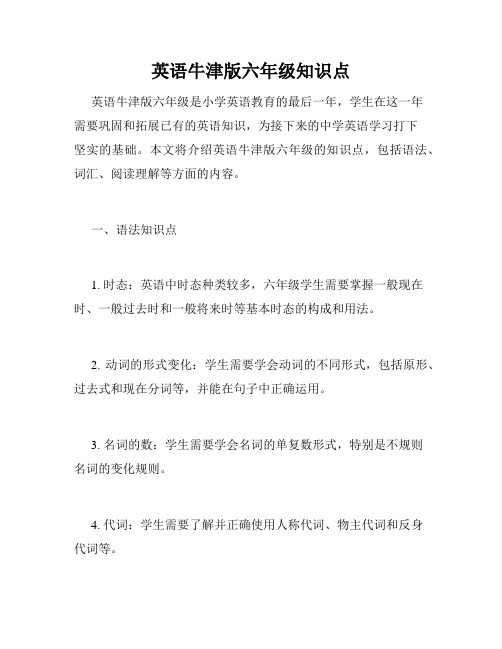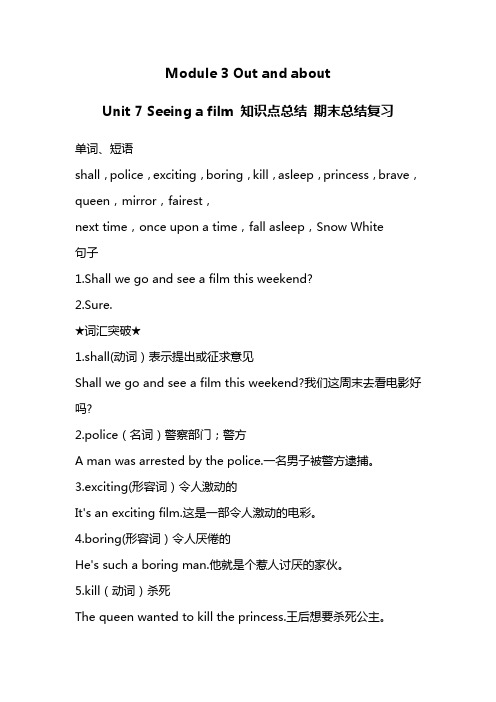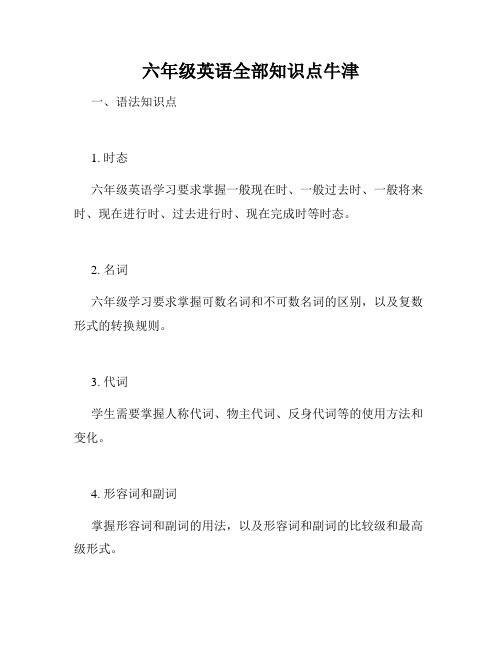小学英语牛津深圳版六年级上册知识点总结
英语牛津版六年级知识点

英语牛津版六年级知识点英语牛津版六年级是小学英语教育的最后一年,学生在这一年需要巩固和拓展已有的英语知识,为接下来的中学英语学习打下坚实的基础。
本文将介绍英语牛津版六年级的知识点,包括语法、词汇、阅读理解等方面的内容。
一、语法知识点1. 时态:英语中时态种类较多,六年级学生需要掌握一般现在时、一般过去时和一般将来时等基本时态的构成和用法。
2. 动词的形式变化:学生需要学会动词的不同形式,包括原形、过去式和现在分词等,并能在句子中正确运用。
3. 名词的数:学生需要学会名词的单复数形式,特别是不规则名词的变化规则。
4. 代词:学生需要了解并正确使用人称代词、物主代词和反身代词等。
5. 形容词和副词:学生需要学会形容词和副词的用法和比较级、最高级等的变化规则。
二、词汇知识点1. 常用词汇:六年级学生需要掌握一些基本的常用词汇,如家庭成员、动物、食物等,这些词汇在日常生活和学习中经常使用。
2. 句型词汇:学生需要扩展句子结构,学会使用连接词和短语来组成复杂的句子。
3. 扩展词汇:学生需要学习一些拓展词汇,如形容词的同义词和反义词,动词的近义词和一些常用短语搭配等。
三、阅读理解知识点1. 理解短文:学生需要学会阅读并理解一些简短的英文短文,获取信息并回答问题。
2. 猜测词义:学生需要通过上下文的提示来猜测生词的意思,提高阅读能力。
3. 根据短文内容回答问题:学生需要根据短文中的信息来回答问题,培养整体理解能力。
四、写作知识点1. 写作格式:学生需要学会写一篇简单的英语作文,包括开头、主体和结尾。
2. 写作内容:学生可以写一些简单的介绍自己、描述家人或朋友等日常生活的话题,培养写作能力。
3. 语言表达:学生需要运用所学的语法知识和词汇,正确地表达自己的思想和观点。
以上是英语牛津版六年级的一些知识点,通过学习这些知识点,学生可以更好地掌握英语,提升听、说、读、写的能力。
在完成六年级的学习后,学生将具备进一步学习中学英语的能力和信心。
Unit13月考复习资料(知识清单)沪教牛津版(深圳用)英语六年级上册

U1U3 复习资料1. 一般过去式:主语+动词过去式,时间关键词:last year, yesterday, three days ago, in the past,just now 刚才(1) be(am, is, are )动词的过去式,am, iswas arewere如How you last year? I short and weak last year, but now I tall and strong.your dad at home last weekend? No, he .In this photo, her hair short and her eyes big.(2) 行为动词过去式,规则变化加ed ,不规则变化要牢记。
play visit watch wash pick stayenjoy like live do drink eat gohave ride take e make can saydig spend如My brother always (go) to the library at weekends, but he (visit) his grandparents last weekend.I (go) fishing yesterday. I (cook) the fish tomorrow.2. be born 出生In 1979, she (be) born in a small village.3. have 表示有,遇到三单变hasTurtles short tails, but this one no tail. That’s funny.4. fly: 飞(动词),苍蝇(名词)The frog can catch (fly).The (fly) are (fly) around the food.5. 区分:health 健康(名词),healthy 健康的(形容词)Fast food is not good for our .Please don’t eat too much.Fruit and vegetables are food.6. 助动词do, does, did 后面的动词用原形1) What did you for breakfast this morning? (have)I some bread and milk. (have)2) Peter didn’t (eat) breakfast this morning.7. 区分可数名词和不可数名词可数名词复数+s/es:vegetables, noodles, hamburgers, pies, pizzas, eggs, sandwiches, boxes, glasses 不可数名词:fruit,food, milk,water,soup, juice, bread,rice, meat,chicken,fish, ice cream,chocolate 注意:1) some, a lot of + 可数复数、不可数2) a few, too many +可数复数,a little, too much +不可数如I eat a lot of (fruit) and (vegetable) every day.There is only a little (meat) in the fridge.They eat sweet food. (a little/a few)Tim and Judy eat some fish, (chicken) and eggs.8. 情态动词can, should, must 后面的动词用原形,此外,don’t, let’s+动词原形We should (play) sport every day.Let’s (dig) a hole and (sleep) in it.He can not (find) his mum.二词组grow up 长大primary school 小学junior high school 初中during 在...期间spend holiday 度假summer holiday 暑假look around 四处张望catch fly 捕捉苍蝇the Great Wall 长城the Palace Museum 故宫博物院Tian’anmen Square 天安门广场enjoy holiday 享受假期take photos 拍照b efore bedtime 睡觉之前三语言与文化1. Traditional food 传统食物Chinese food: dumplings, ricethe UK: fish and chips, hamburgersJapanese food: Sushi 寿司2 Country & Capital 国家、首都Beijing,China London, the UK Tokyo, Japan(日本东京) Washington, the US(美国华盛顿) Canberra, Australia(澳大利亚堪培拉,悉尼Sydney 是城市)3 城市著名景点Beijing: the Great Wall, the Palace Museum, Tian’anmen SquareLondon: Big Ben 大本钟, the British Museum 大英博物馆, London Eye 伦敦眼)Hi, my name’s Lily. I was born in Shenzhen, China. Look, these are my photos.In Photo 1, I was a baby. I was about two months old. I was small and cute.In Photo 2, I was one year old. My hair was short and my eyes were big.Now I am 11 years old. I am tall and pretty. I am a primary school student. I am good at English. I want to be a teacher in the future.Unit 2 My summer holidayMy summer holidayMy summer holiday was fun.I went to Beijing with my parents.We went there by plane.We visited the Great Wall, Tian’an men Square and the Palace Museum.We went to some famous parks and took a lot of photos.We had a good time.How was your summer holiday?Unit 3 Healthy or unhealthyI had three meals yesterday.I had some bread, some milk and an egg for breakfast.I had some rice, fish and an apple for lunch.I had a little fish, some vegetables and noodles for dinner.We should eat a lot of fruit and vegetables.We should drink a lot of water.We should play sport very often.四作文。
牛津深圳版英语六年级上册第7单元知识点总结期末复习资料

Module 3 Out and aboutUnit 7 Seeing a film 知识点总结期末总结复习单词、短语shall,police,exciting,boring,kill,asleep,princess,brave,queen,mirror,fairest,next time,once upon a time,fall asleep,Snow White句子1.Shall we go and see a film this weekend?2.Sure.★词汇突破★1.shall(动词)表示提出或征求意见Shall we go and see a film this weekend?我们这周末去看电影好吗?2.police(名词)警察部门;警方A man was arrested by the police.一名男子被警方逮捕。
3.exciting(形容词)令人激动的It's an exciting film.这是一部令人激动的电彩。
4.boring(形容词)令人厌倦的He's such a boring man.他就是个惹人讨厌的家伙。
5.kill(动词)杀死The queen wanted to kill the princess.王后想要杀死公主。
6.asleep(形容词)睡着的That film was boring.I nearly fell asleep,那个电彩太无聊了,我几乎睡着了。
★句型突破★Shall we go and see a film this weekend?我们这个周末一起去看电影好吗?Sure.好的★知识拓展★词汇集中营1.action film动作片2.horror film恐怖片edy喜剧片4.science fiction film科幻片5.musical film歌舞片6.film ticket电影票7.ticket office售票处8.entrance入口9.exit出口10.seat座位11.screcn笑屏12.bored感到无聊13.excited感到兴奋的14.he excited about对……感到兴奋15.interested感兴趣的16.be interested in对……感兴趣。
牛津版六年级上册知识要点

[词汇]always 总是 question 问题ask 问 mean 意思是,意指must 必须;应当 should 应当,应该take a walk 散步 pick 拾public 公共的,公众的 sign 标志;告示牌consin 堂(表)兄弟;堂(表)姐妹 danger 危险away (离)开 grass 草;草地keep off (使)让开;(使)不接近shouldn’t=should notbird 鸟 cage 笼子quiet 安静的,静静的 make noise 发出(喧闹)的声音smoke 吸烟 litter 乱丢杂物park 停放(车辆等) suddenly 突然(地)something 某事;某物 note 钞票,纸币look around 环顾,往四周看 nearby 附近(的)quickly 快地 pick up 拾起,捡起keeper 看守人 come up 上来point 指 fine罚款[词组]1. in the park 在公园2. only four years old 只有四岁3. a lot of = lots of 许多4. public signs公共标志5. ask sb. about sth. 问某人有关某事6. different things 不同的东西7. on the wall 在墙上 8. go in 进去9. stay away from the building远离建筑 10. on the grass在草地上11. keep off the grass 远离草地 12. walk on the grass 走在草地上13. be quiet 安静 14. make noise 发出吵闹声15. know a lot about sth.对某事了解很多 16. no smoking 禁止吸烟17. no littering 不准乱扔 18. no parking 禁止停车19. Do not touch. 不准触碰。
牛津六年级英语上册知识点

牛津六年级英语上册知识点在牛津六年级英语上册中,学生将学习到许多重要的知识点,这些知识点将帮助他们更好地理解和运用英语。
下面将介绍几个重要的知识点。
一、动词的时态动词的时态是英语语法中的重要内容之一。
在六年级上册中,学生将学习到一些常见的时态,包括一般现在时、一般过去时和将来时。
1. 一般现在时:表示经常性的或普遍性的动作或事实。
例如:I play basketball every Saturday.(我每个星期六打篮球。
)2. 一般过去时:表示过去发生的动作或事情。
例如:She watched a movie last night.(昨晚她看了一部电影。
)3. 将来时:表示将要发生的动作或事件。
例如:We will have a party next week.(下周我们将举办一场派对。
)二、名词的单复数在牛津六年级英语上册中,学生将学习名词的单复数形式。
名词的单复数形式对于正确使用英语非常重要。
1. 单数名词:表示只有一个的事物或人。
例如:a book(一本书)、a cat(一只猫)。
2. 复数名词:表示有多个的事物或人。
例如:books(书籍)、cats(猫)。
三、形容词的级别形容词的级别表示事物的不同程度或者比较。
在六年级上册中,学生将学习比较级和最高级。
1. 比较级:用于比较两个事物或人的程度。
例如:My backpack is bigger than yours.(我的背包比你的大。
)2. 最高级:用于比较三个以上事物或人的程度。
例如:This is the most delicious cake I've ever had.(这是我吃过最美味的蛋糕。
)四、疑问句和否定句在六年级上册中,学生将学习到如何构造疑问句和否定句。
1. 疑问句:用于提问。
例如:Do you like ice cream?(你喜欢冰淇淋吗?)2. 否定句:表示否定的意思。
例如:I don't want to go to the party.(我不想去派对。
六年级英语全部知识点牛津

六年级英语全部知识点牛津一、语法知识点1. 时态六年级英语学习要求掌握一般现在时、一般过去时、一般将来时、现在进行时、过去进行时、现在完成时等时态。
2. 名词六年级学习要求掌握可数名词和不可数名词的区别,以及复数形式的转换规则。
3. 代词学生需要掌握人称代词、物主代词、反身代词等的使用方法和变化。
4. 形容词和副词掌握形容词和副词的用法,以及形容词和副词的比较级和最高级形式。
5. 动词学生需要掌握动词的一般现在时、一般过去时和将来时的使用方法,并能正确运用各种动词时态进行句子的变换。
6. 介词掌握常见的介词的用法,如in、on、at等,并了解其在表示时间和地点方面的用法。
7. 冠词了解冠词的用法和区别,如定冠词the和不定冠词a/an的使用规则。
8. 从句学会主从复合句的构成和使用,如宾语从句、定语从句、状语从句等。
9. 疑问句学会构造和使用疑问句,包括一般疑问句、特殊疑问句和选择疑问句等。
二、词汇知识点1. 常用词汇学生需要掌握一定量的常用单词,包括名词、动词、形容词、副词等。
2. 短语和固定搭配学生需要掌握一些常见的短语和固定搭配,如take care of、look forward to等。
3. 同义词和反义词了解一些常见单词的同义词和反义词,并能正确运用。
4. 各类词汇扩展学生需要通过阅读和积累来扩展自己的词汇量,提高词汇应用能力。
三、阅读理解知识点1. 理解文章主旨学生需要通过阅读短文,能够准确理解文章的主旨和大意。
2. 掌握阅读策略学生需要学会运用一些阅读策略,如找关键词、扫读和略读等方法,提高阅读理解能力。
3. 回答问题学生需要通过阅读短文,能够根据问题准确回答问题,理解文章细节。
4. 掌握阅读技巧学生需要通过阅读理解练习,掌握一些阅读技巧,如推理、判断等,提高阅读能力。
四、听力知识点1. 听懂简短对话学生需要能够听懂简短对话,理解对话中的信息和意思。
2. 听懂口头说明学生需要能够听懂老师或同学口头的说明,理解说明的内容和要求。
深圳小学英语(牛津版)六年级上册同步单词、音标、注释、例句
深圳小学英语(牛津版)六年级上册同步单词、音标、注释、例句Unit 11. month [mʌnθ] n. 一个月的时间;月份[ 复数 months ]2. cute [kjuːt]adj. 可爱的;[ 比较级 cuter 最高级 cutest ]3. Pretty ['prɪtɪ]adj. 漂亮的4. Handsome ['hæns(ə)m] adj. 英俊的;帅气的[ 比较级 handsomer 最高级 handsomest ]5. turtle['tɜːt(ə)l] n. 乌龟[ 复数 turtle或turtles ]6. catch [kætʃ] vt. 逮住;扑捉[ 过去式 caught 过去分词 caught 现在分词 catching ]7. fly [flaɪ]n. 苍蝇[ 复数 flies 过去式 flew 过去分词 flown 现在分词 flying ]8. grow up [ grəʊʌp ] 长大;成长9. junior high school['dʒuːnɪə] [haɪ][skuːl] 初级中学10. (be) born [bɔːn] 出生例句:Some people are born brainy. 有些人生来就聪明。
Unit 21. famous ['feɪməs] adj. 著名的;出名的2. during['djʊərɪŋ] prep. 在...期间3. spend [spend] vt. 度过[ 过去式 spent 过去分词 spent 现在分词 spending ]4. everyone ['evrɪwʌn] pron. 每个人;所有人5. countryside ['kʌntrɪsaɪd] n. 乡村;农村[ 复数 countrysides ]6. pick[pɪk] vt. 采摘[ 过去式 picked 过去分词 picked 现在分词 picking ]7. summer holiday['sʌmə] ['hɒlɪdeɪ;-dɪ]暑假Unit 31. healthy ['helθɪ] adj. 健康的;有益于健康的2. unhealthy[ʌn'helθɪ] adj. 不健康的;损害健康的3. hamburger [ˈhæmbɜ:gə]n. 汉堡包4. cola ['kəʊlə] n. 可乐5. yesterday [ˈjestədɪ;-deɪ]n. 昨天6. fruit [fruːt] n. 水果[ 复数 fruits或fruit ]7. pie [paɪ] n. 馅饼8. pizza ['piːtsə; 'pɪtsə] n. 比萨饼9. sandwich ['sæn(d)wɪdʒ; -wɪtʃ] n. 三明治[ 复数 sandwiches ]10. vegetable [ˈvedʒtəbl]n. 蔬菜[ 复数 vegetables ]11. chicken ['tʃɪkɪn]n. 鸡肉12. chocolate ['tʃɒk(ə)lət]n. 巧克力13. a little ['lɪt(ə)l] adj. 少量的!14. fish and chips [fɪʃ] [ənd ][tʃɪps] 炸鱼薯条Unit41. neighbour ['neɪbə] n. 邻居2. son [sʌn]n. 儿子3. daughter['dɔːtə] n. 女儿4. noisy [ˈnɔɪzɪ] adj. 吵闹的5. owl [aʊl] n. 猫头鹰6. dig [dɪg] vt. 挖(土),掘(洞)[ 过去式 dug或 digged 过去分词 dug或 digged 现在分词 digging ]7. make noise [meɪk][nɔɪz] 制造噪音Unit 51. thousand ['θaʊz(ə)nd] n. 一千[ 复数 thousand或thousands ]2. hundred ['hʌndrəd] n. 一百[ 复数 hundreds或hundred ]3. wild [waɪld] adj. 野生环境;野生的4. South China tiger 华南虎[ manchurian tiger 东北虎]5. blue whale [bluː] [weɪl] 蓝鲸6. way [weɪ] n. 路;方式,方法7. die [daɪ] vi. 死;死亡8. rhino ['raɪnəʊ] n. 犀牛rhinoceros [raɪ'nɒs(ə)rəs][ 复数 rhinos或 rhino ]9. learn [lɜːn] vt. 学会,学习[ 过去式 learned或 learnt 过去分词 learned或 learnt 现在分词 learning ] 10. send [send] vt. 安排去,寄,送[ 过去式 sent 过去分词 sent 现在分词 sending 第三人称单数 sends ]11. in danger[ˈdeɪndʒə(r)] 面临危险12. in the past 在过去例句:In the past she drank nothing, except coffee.她过去除了喝咖啡什么都不喝。
沪教牛津版(深圳)英语六年级全册知识总结
尚学吧六年级英语期末复习重点一.冠词a、an、the:a和an的区别:an用于元音音素(一般就是元音字母aeiou)前,a用于辅音音素前。
the用于特指。
例如:an orange 一只桔子 a cat一只猫the earth这个地球二介词1.表示时间的介词(1)at:用于表示时刻,时间的某一点。
at noon在午时at night在夜间at present目前(2)on:用于星期,某天,某一天的上午、下午、晚上(指具体的某一天时,一律用on)on Sunday在星期天on sunday morning 在星期天的上午on march 8 在3月8日(3)in:用于表示周、月、季节、年、泛指上午、下午、晚上。
in 1999 在1999年in November 在11月份in summer 在夏季in the afternoon在下午at表示片刻时间;in表示一段时间;on总是与日子有关。
2.表示地点的介词(1)at:在某地点(表示比较狭窄的场所)at school上学at home在家at the station 在火车站(2)in:在某地(表示比较宽敞的场所)she will arrive in shanghai at ten .10点她将到达上海。
3.方位介词:in, on, under, behind, near..….1). in表示"在……中","在……里面"。
例如in our class 在我们班上in my bag 在我的书包里in the classroom 在教室里2). on 表示"在……上"、"在……表面"。
例如on the wall 在墙上on the desk 在桌子上on the blackboard 在黑板上3). under表示"在……下"。
例如under the tree 在树下under the chair 在椅子下under the bed 在床下4). behind表示"在……后面"。
牛津英语六年级上册英语的知识点
一、英语单词:六年级上册的英语单词主要包括日常生活中常用的词汇,如数字、颜色、食物、动物、身体部位、家庭成员、学校用品、季节、天气和节日等。
学生需要通过课堂学习和课后复习来巩固这些单词的拼写和发音。
二、语法:1. 名词复数形式:学生需要掌握名词变复数的规则,如在名词后加s或es,或者通过变化字母来表示复数形式。
2. 人称代词:学生需要学会使用I、you、he、she、it、we和they等人称代词,并正确地在句子中使用它们。
3. 动词的现在进行时:学生需要学会使用动词的现在进行时来描述正在发生的动作,如“I am eating.”和“They are playing.”4. 一般现在时:学生需要学会使用动词的一般现在时来表示经常性的动作或客观事实,如“I drink milk every morning.”和“The sun rises in the east.”5. 情态动词can和could:学生需要学会使用can和could来表示能力、允许、请求和建议等。
6. 物主代词:学生需要学会使用物主代词来表示所有权,如“his, her, their”等。
六年级上册的阅读材料主要以短文的形式呈现,学生需要通过阅读来理解文章的主旨和细节。
同时,还需要学会通过猜测词义的方式来推测生词的意思,并回答与文章相关的问题。
四、写作:六年级上册的写作部分主要包括书面表达和口头表达两方面。
学生需要学会使用正确的形式和句型来描述人物、事物、地点和活动等,并能够通过语言表达自己的思想和观点。
五、听力:六年级上册的听力部分主要包括听对话、短文和广播等形式的听力材料,并根据听到的内容回答相关问题。
学生需要学会提取关键信息,理解听到的内容,并正确地回答问题。
六、其他:除了上述几个主要知识点外,六年级上册的英语教材还包括了一些与英语学习相关的其他知识点,如词汇拓展、英语习惯用语、句子搭配等。
学生可以通过课外阅读和与外国人交流来进一步提升自己的英语水平。
深圳六年级英语上册知识点
深圳六年级英语上册知识点深圳六年级英语上册主要包含了以下几个知识点:单词拼写、词组用法、语法规则以及阅读理解等。
下面将逐一介绍这些知识点,并且提供相关示例,以帮助同学们更好地掌握。
一、单词拼写1. 动物类:cat(猫)、dog(狗)、elephant(大象)、lion(狮子)等。
2. 食物类:apple(苹果)、banana(香蕉)、cake(蛋糕)、hamburger(汉堡包)等。
3. 学科类:math(数学)、English(英语)、history(历史)、science(科学)等。
4. 数字类:one(一)、two(二)、three(三)、four(四)等。
5. 人物类:teacher(老师)、student(学生)、doctor(医生)、policeman(警察)等。
二、词组用法1. 问候用语:Hello!(你好!)、Good morning!(早上好!)、How are you?(你好吗?)等。
2. 日常用语:Thank you!(谢谢!)、May I go to the restroom?(我可以去洗手间吗?)等。
3. 时间短语:in the morning(在早上)、at night(在晚上)、on weekends(在周末)等。
4. 地点短语:at school(在学校)、in the park(在公园)、on the playground(在操场上)等。
5. 动作短语:go swimming(去游泳)、play basketball(打篮球)、read books(读书)等。
三、语法规则1. 一般现在时:表示经常性的动作或事实。
例如:I often play football on weekends.2. 一般过去时:表示过去发生的动作或事情。
例如:Yesterday,I went to the zoo with my family.3. 现在进行时:表示现在正在进行的动作。
例如:She is reading a book at the moment.4. 一般将来时:表示将来要发生的动作或计划。
- 1、下载文档前请自行甄别文档内容的完整性,平台不提供额外的编辑、内容补充、找答案等附加服务。
- 2、"仅部分预览"的文档,不可在线预览部分如存在完整性等问题,可反馈申请退款(可完整预览的文档不适用该条件!)。
- 3、如文档侵犯您的权益,请联系客服反馈,我们会尽快为您处理(人工客服工作时间:9:00-18:30)。
小学英语牛津深圳版六年级上册知识点总结Module 1 Getting to know each otherUnit 1 Growing up单词、短语:month,cute,pretty,fly,turtle,handsome,catch,grow up,(be)born,junior high school 句子:Her hair was short and her eyes were big.★词汇突破★1.month(名词)月份There are 12 months in a year,一年有12个月份。
2.cute(形容词)可爱的I have a cute cat.我有一只可爱的小猫。
3.pretty(形容词)漂亮的She is a very pretty girl.她是一个非常漂亮的小女孩儿。
4.handsome(形容词)英俊的;帅气的He is handsome.他很帅。
5.catch(动词)逮住;捕捉I jumped up to catch a ball and fell over.我跳起来接球,结果摔倒了。
6.grow up长大;成长The children are growing up.孩子们正在成长。
7.(be)born出生I was born in Changchun.我出生在长春。
★句型突破★Her hair was short and her eyes were big.(那时)她的头发短,她的眼睛大。
★知识拓展★一般过去时1.一般过去时表示过去某个时间里发生的动作,常和表示过去的时间状语连用,如:yesterday,last night,this morning,in 1990,ago,since 1999,last(week,year,night,month...)等。
2.下面的歌谣可以帮助你理解一般过去时,快来读一读吧!动词一般过去时,表示过去发生的事;一般动词加ed,若是特殊得硬记;be 用was 或用were,have,has变had;谓语动词过去式,过去时间做标志;否定句很简单,主语之后didn't添;疑问句也不难,did放在主语前。
Unit 2 My summer holiday单词、短语famous,during,spend,everyone,pick,countryside,summer,holiday 句子1.How was your summer holiday?2.It was wonderful. We went to the Great Wall.★词汇突破★1.famous(形容词)著名的She is a famous singer.她是一位著名的歌手。
2.during(副词)在…….期间During the holiday,I went to Shanghai.假期我去了上海。
3.spend(动词)度过She will spend her holiday in London.她将要在伦敦度假。
4.everyone(名词)每个人Everyone had a good time.每个人玩得都很开心。
5.countryside(名词)乡村;农村He lives in the countryside.他住在农村。
6.pick(动词)采摘Don't pick flowers in the garden.不要在花园里摘花。
★句型突破★How was your summer holiday?你的暑假过得怎么样?It was wonderful.We went to the Great Wall.非常棒。
我们去了长城。
★知识拓展★中外名胜你还知适哪些国内外的风景名胜?来了解一下吧!West Lake 西湖Huangshan 黄山Mount Tai泰山the Great Wall长城Mogao Grottoes莫高窟Mausoleum of the First Qin Emperor秦始皇陵the Palace Museum故宫博物院the Summer Palace颐和园the Temple of Heaven天坛Jiuzhaigou九寨沟the Potala Palace 布达拉宫the Eiffel Tower 埃菲尔铁塔the Louvre Museum 罗浮宫Mount Fuji富士山London Tower Bridge伦敦塔桥the Leaning Tower of Pisa比萨斜塔Sydney Opera House悉尼歌剧院Yellowstone National Park 黄石国家公园Unit 3 Healthy or unhealthy?单词、短语Healthy,fruit,unhealthy,chocolate,hamburger,pizza,yesterday,sandwich,vegetable,chicken,pie句子1.What did you have for breakfast this morning?2.I had some bread and milk.★词汇突做★1.healthy(形容词)健康的That's not healthy,那很不健康。
2.unhealthy(形容词)不健康的Don't eat unhealthy food.不要吃不健康的食物。
3.fruit(名词)水果I have fruit everyday.我每天都吃水果。
4.chocolate(名词)巧克力Don't eat too much chocolate.不要吃太多巧克力。
5.hamburger(名词)汉堡Children like to eat hamburgers.孩子们喜欢吃汉堡。
6.pizza(名词)比萨She likes fruit pizza.她喜欢水果比萨。
7.sandwich(名词)三明治I had a sandwich this morning.今天早晨我吃了一个三明治。
8.vegetable(名词)蔬菜Vegetables are good for our health.蔬菜对我们的健康有益。
9.chicken(名词)鸡肉We often eat chicken.我们经常吃鸡肉。
★句型突破★What did you have for breakfast this morning?你今天早上吃了什么早餐?I had some bread and milk.我吃了一些面包和牛奶。
★知识拓展★可数名词与不可数名词下列可数名词和不可数名词,你能正确使用吗?【可数名词】vegetable(蔬菜),hamburger(汉堡),candy(指糖块,复数为candies),ice cream(指甜筒冰淇淋).【不可数名词】rice(米饭),water(水),fish(鱼),cola(可乐),fruit(泛指水果),chicken(鸡肉),bread(面包),yoghurt(酸奶),food(泛指食物),chocolate(巧克力),ice cream(泛指冰淇淋).Module 2 RelationshipsUnit 4 Our neighbours 单词、短语neighbour,son,dig,daughter,noisy,owl,sometimes 句子1.Did you play with Sam last weekend?2.Yes,I did.★词汇突破★1.neighbour(名词)邻居(美式英语:neighbor)Mr Lin is my neighbour.林先生是我们的邻居。
2.son(名词)儿子His son learns fast and well.他的儿子学得又快又好。
3.daughter(名词)女儿May I speak to your daughter?我可以和你的女儿说话吗?4.dig(动词)挖;掘They begin to dig into the hill.他们开始在山上挖洞。
5.noisy(形容词)吵闹的It's too noisy.太吵了。
6,sometimes(副词)有时I sometimes watch TV on the weekend.我有时周末看电视。
★句型突破★Did you play with Sam last weekend?上周末你和山姆玩了吗?Yes,I did.是的。
★知识拓展★1.noisynoisy这个形容词是由名词noise(殊音)变化而来的。
类似的单词还有:snow-snowy(雪天)rain-rainy(多雨的)smell-smelly(发臭的)taste-tasty(美味的)health-healthy(健康的)friend-friendly(友好的)注意到变化规则了吗?有些是在名词词尾加-y,有些是加-ly。
2.son和daughterson 和daughter分别表示“儿子”和“女儿”,那么“孙子”和“孙女”怎么表达呢?就是在两个词前面加grand,分别是grandson, granddaughter。
如果不表明性别,可以用grandchild 表示。
21Unit 5 Animals in danger单词、短语thousand,wild,hundred,way,die,learn,send,rhino,blue whale,South China tiger句子In the past,there were many pandas.★词汇突破★1.thousand(名词)一千There are over three thousand students in our school.我们学校有三千名以上的学生。
2.hundred(名词)百It cost one hundred dollars.它位一百美元。
3.wild(形容词)野生的It is difficult for pandas to live in the wild.对大熊猫来说,在野外生存是很因难的。
4.way(名词)路;方式I met her on my way home.我在同家的路上遇到了她。
5.die(动词)死The dog died yesterday.小狗昨天死了。
6.learn(动词)学习I learnt how to drive last year.我去年学会了开车。
7.send(动词)寄;送Who sent this letter to me?谁给我寄的信?★句型突破★In the past,there were many pandas.在过去,这里有许多熊猫。
★知识拓展★数量单位你知道英语中百以上数量的表达方法吗?1.整百数由one~nine 加hundred构成,并且用单数。
